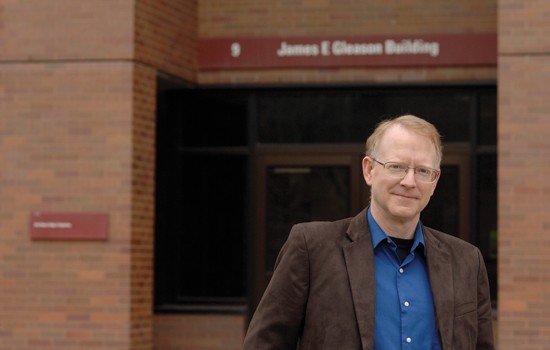James Moon: A change in career path developed a love of teaching
A. Sue Weisler
James Moon
In recounting his path from college to Eastman Kodak Co. to teaching in the classrooms of the Kate Gleason College of Engineering, James Moon acknowledged that he was taught and influenced by some of the very best in the engineering field. Today, both students and peers look upon him as one of the best and recognized him with a 2009 Richard and Virginia Eisenhart Award for Excellence in Teaching.
Moon came to RIT by way of Kodak. When the transition from chemical film processing into more digital applications began, he participated in RIT’s Bridge Program, a continuing education program to develop new skills for a changing corporation.
It was in the Bridge Program that Moon met Swaminathan Madhu, professor of electrical engineering at RIT. He influenced Moon to not only pursue electrical engineering but also to become an educator. As a mentor, Mahdu ensured that Moon knew he was capable of success and, in turn, Moon has tried to instill this confidence in his students’ abilities today. “They have to know you want them to learn and it’s important for them to hear that you believe they have the abilities,” he says.
Moon keeps himself up-to-date in his field and rigorously prepares for each of his classes. “I cannot be unorganized—this would be an unmitigated catastrophe,” he states with a laugh. “Students are like anyone else—they don’t appreciate chaos. They can get lost in a bazillion details, but they must have the big picture. This is rocket science we are doing.”
Moon is also a strong proponent of open-door policies and making sure students know that they are welcome. “I don’t want a student ever to think they are imposing.”
Having worked in design and process engineering and as a fabrication manager, Moon brings a real-world sensibility to the classroom. His corporate experience helps students understand how to balance work and personal life, that they may change career paths several times in their lives and that they must manage this change.
Recently, Moon had the chance to return to past interests and be a student himself once again. When he was taking graduate classes at the University of Rochester in the late 1970s, he was also taking piano lessons, studying with a faculty member at the Eastman School of Music and presenting several recitals in Kilbourn Hall.
He just returned to the piano again after several years of limited playing. He performed in a recital recently with several other students at Nazareth College, just two pieces. It is a first step toward a full recital at some point in the next several years, if his teacher can stand it, he adds.
“I’m an old-school professor, some lectures, some real-world examples, not much entertainment, a few bad jokes every once in a while,” he jokes. “There is great value and tremendous satisfaction in the process of learning per se. I try to convey the value of hard-won information and the personal, intellectual satisfaction that comes from struggling and finally understanding. This appreciation for learning is something that students will carry with them for the rest of their lives. I also point out that, when they get to my age, it is way less dangerous (and more satisfying) to solve a math problem than to, say, go skiing.”



